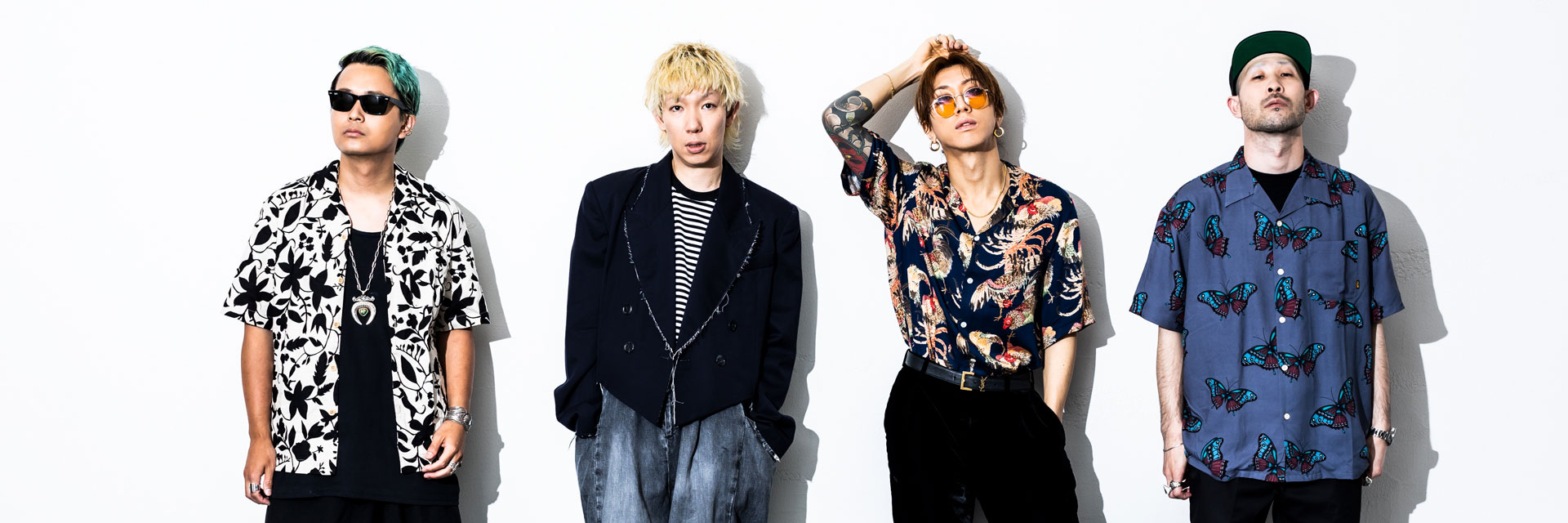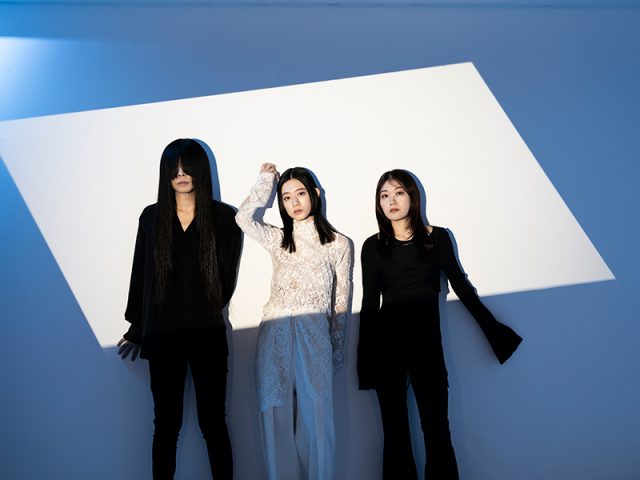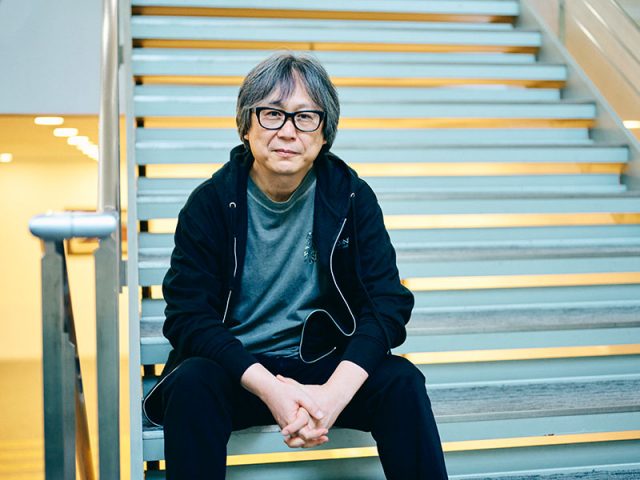“NieR:Automata Ver1.1a”: Producer Opens Up About Her Passion for the Original Work and How She Poured Her Heart and Soul Into the Anime Adaptation [Part 1 of 2]
2024.08.16


2023.06.27
“Artist Profile” - a serial feature uncovering the true stories of up-and-coming artists.
Since re-signing with a major label in 2020, SUPER BEAVER has been on a winning streak. In 2023, they embarked on numerous live tours in addition to their major spring and autumn tours. On June 28, they released a new song “Hakanakunai.” They are the most dynamic rock band at the moment, making headlines even for the opening performance at Zepp Shinjuku (TOKYO) in April. Let’s explore the journey that brought them to their current state, an uneven path that includes the many twists and turns that have brought them here to this point.
In the first part, they open up about their feelings behind their new song, “Hakanakunai.”
※The original Japanese article appeared on June 27 and 28, 2023.
SUPER BEAVER
(From left to right in the photo) Kenta Uesugi (Bass), Ryota Yanagisawa (Guitar), Ryuta Shibuya (Vocal), Hiroaki Fujiwara (Drums). Formed in 2005 by high school seniors and juniors Shibuya, Uesugi and Yanagisawa, plus Yanagisawa’s childhood friend Fujiwara. They made their major debut in 2009 with the single "Shinkokyu," but in 2011, they left their label and agency to go indie. In June 2020, they re-signed to a major label with the single "Highlight / Hitoride Ikiteitanaraba [If I were living alone]." They have been actively performing, attracting attention ever since.
Today, there are probably few people who have not heard their name or their music. SUPER BEAVER has been rapidly gaining recognition in the Japanese music scene, boasting a unique presence that is not influenced by anything or anyone else. They are a band that continues to stir the hearts of not only rock fans but also a wider audience.
During our interview, they were caught up in a hectic schedule, with photo shoots and interviews meticulously arranged down to the minute. Yet, they showed no signs of fatigue. Rather, they just laughed it off, saying, "We still have a long way to go. We know people who are even busier, so we're grateful for the variety of activities we're able to do. Of course, we sometimes feel like we want a break, but having nothing to do actually makes us uneasy" (Ryuta Shibuya). "Rest is rest, and whether the band is active or not, we'll just be living our lives to the fullest" (Kenta Uesugi). Their light-hearted yet determined attitude may have been fostered in the path they have taken thus far.
As many of you may already know, SUPER BEAVER made their major label debut in 2009. However, it wasn't smooth sailing, as they parted ways with their label and agency after just over two years. It must have been a painful setback for them, as they were still in their early twenties. Nevertheless, the four members chose to continue the band and energetically pursued activities in the indie scene. They performed nearly 100 live shows a year, and before the onset of the pandemic, they had increased their appearances at festivals and events, growing into one of the top live acts [in Japan].
Then in 2020, they made an unusual move, re-signing with a major label. It caused quite a stir that the label was Sony Music Records, which is part of the same group as their former label, EPIC Records Japan. There's no need to explain their subsequent success. Their song "Namae wo Yobuyo," featured as the theme song for the live-action adaptation of the popular manga "Tokyo Revengers" in 2021, garnered attention alongside the movie's success, propelling the band into stardom overnight. Their subsequent release, "Hitamuki," became the opening theme for the sixth season of the TV anime "My Hero Academia." They followed up that effort with "Gradation," which was chosen as the theme song for the sequel movie "Tokyo Revengers 2: Bloody Halloween - Destiny," and continued to shine in the spotlight.
And now, SUPER BEAVER will release their new song, "Hakanakunai” on June 28. It serves as the theme song for the movie "Tokyo Revengers 2: Bloody Halloween - Decisive Battle," which will be released on June 30. The song is a mid-tempo ballad, which features a completely different flavor from the previous two songs and finishes the trilogy of the theme songs for the series, continuing from “Namae wo Yobuyo” and “Gradation.” Ryota Yanagisawa, who wrote the lyrics and composed the song, shares the inspiration behind the song;
“I was told that 'Tokyo Revengers 2: Bloody Halloween' would be split into two parts, and that they wanted a theme song for each part. This time, in particular, it is the conclusion of the series, and I was told that it would be even better if the music could encompass everything. So, from the very beginning, I wanted to create a genuinely good song, a song that you could really dive into. There wasn't necessarily a restriction that it had to be a ballad, but I naturally came up with the image of a mid-tempo ballad."
This song, which confronts head-on the unavoidable themes of life and death, is truly a gem. Despite encompassing grand, universal themes, it never gets lost in its grandeur. Instead, it weaves earnest and warm emotions with a lifelike perspective that directly touches the depths of the heart upon first listen.
"It's beautiful because it's fragile / It doesn't have to apply to life," "I want to keep living stubbornly with a smile / If I could, together with you." These lyrics are imbued with a prayer-like longing. The title "Hakanakunai" [which can mean “Not Fleeting”] carries the dedication of the band's wholehearted wish for everyone who listens to their music to live, no matter what.
Ryota Yanagisawa recalled: “As you mentioned, I think this is something closer to a prayer or a wish rather than a declaration. From the very beginning, depending on how you interpret it, there's a feeling of being selfish or stubborn, a desire to go against fate.... In this world where there are countless values coexisting, there are many issues where we misunderstand and misinterpret each other. Among them, matters concerning life and death are the most prominent.
No matter what one thinks, no matter what one says, there are always points where we misunderstand each other. Yet, the fact that ‘it will end someday’ is something everyone equally faces. Finally, in this song, we were able to sing about the feelings we wished for. It’s a song that we could sing with a level of intensity that aims to deliver these feelings without pressing people too hard.”
Kenta Uesugi agreed: "When I listened to the demo given to me by Yanagisawa, I was simply struck by it – it’s a great song. As a band, I think it's wonderful that we'll be singing songs with these kinds of themes from now on. Even for us, now in our mid-thirties, this song feels relatable. As you live, you experience various changes in environment. You meet with people, you’re apart from people. You experience all sorts of other things that accumulate day by day. At this moment in my life, there was something in this song that resonated with me personally."
Hiroaki Fujiwara continued: "Of course, there are moments when I feel the sensation of being alive, the feeling of not wanting to die and thinking that I have to live, all of this while being in the band. I'm sure many people will feel a multitude emotions when they listen to this, so I can't help but think, I want them to somehow keep living, after all. I approached the production of this song with the thought that I want them to hang in there, even if it's tough, and [through this song] if I could somehow be of any help to them."
The simple yet robust and embracing sound of the band, combined with the delicate and graceful tones of the piano and strings, gently accompany the listener's emotions while vigorously moving them to the core.
As Yanagisawa described it, this song is sung with a level of intensity that aims to deliver these feelings without pressing too much, making it emotional yet devoid of any sense of forced sentimentality. It's neither a grandiose, overly preachy anthem nor a lofty, unrealistic celebration of life but rather a song that, when listened to, will reverberate within each individual's heart as their own personal anthem.
Ryuta Shibuya revealed: "I think this is a song that we've never had before, one that pushes the main themes of life and death so strongly. While it's an incredibly large-scale song, it also feels like it can hit home and resonate with each person individually. So, while singing it, I thought about how it would be good if the listeners could think of specific things from their life, like their loved ones or their precious moments. I thought about how to sing it a lot. The points that touch each person and the memories they evoke will surely be different for everyone, so I wondered what approach would be best.
Before recording, I tried expressing emotions in various ways, but to put it bluntly, each way was correct. However, when thinking about why we are playing music and why we want people to listen to it, I realized that this was the most crucial point, and this is how I came to sing it. While it was essential to convey my emotions, I also wanted to leave room for the listeners to interpret it for themselves.”
Instead of solely expressing his emotions as a singer, Shibuya wanted to make sure that those who listen to "Hakanakunai" have a place to anchor their own feelings. Shibuya's idea of providing this anchor transformed this already outstanding song from the demo stage into an even grander and more profound piece of music. This song will likely become a new representative piece in SUPER BEAVER's history. Yanagisawa concluded it this way;
"I think this is a song that we were able to create because it’s ‘now.’ The theme of this song is something we've been vaguely thinking about for a long time. It just happened to be able to take shape thanks to the opportunity to be the theme song for the movie.
To begin with, this band couldn’t create songs that didn't revolve around collaborations. 'What does SUPER BEAVER want to sing about the most?' was always the underlying question. In that sense, ‘Hakanakunai’ is a song that we want to keep singing in the future, and I think it's great that we were able to create a song at this point in time that, when we look back on it later, could be a starting point of sorts for the band.”
Nevertheless, "Hakanakunai" is indeed a very SUPER BEAVER-like title. As mentioned earlier, despite the challenging journey they've endured, they're still standing here, even today. Although they debuted at such a young age, their path was full of ups and downs, and there were surely days of struggle and hesitation. They must have been torn between their ideals and reality many times.
Perhaps the reason why SUPER BEAVER's music is enthusiastically supported lies in the genuine passion that only those who have persevered step by step can create. Perhaps, at times, it's because we find courage in their way of living. The real life of these four individuals who continue to live through challenging days is not transient, and therein lies its beauty. Living tenaciously, achieving the milestone of a major re-debut—is truly not transient at all.
Text by Yuko Honma
Photos by Hidemi Otsuka
Translated by Yumi Hasegawa

2024.08.16

2024.07.31

2024.03.05

2024.02.16

2023.11.15

2023.10.30
Follow the official Sony Music SNS
Get the latest news from Cocotame